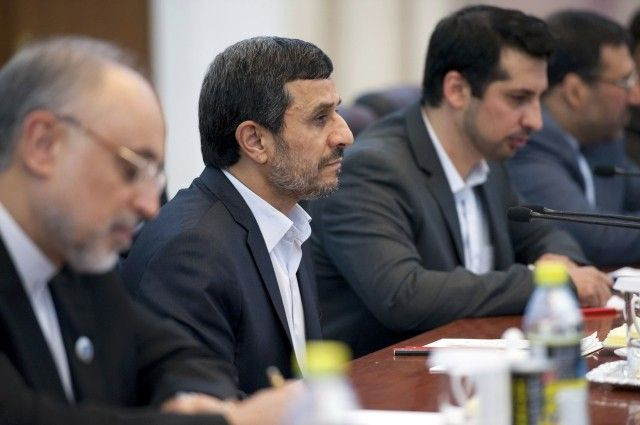Iran Gets Diplomatic Boost In Beijing, And Not Just From China

Iran is getting a major diplomatic boost in Beijing. The support is not only coming from China, but also from Russia, Central Asian states and Pakistan.
China and Russia used the platform of the Shanghai Cooperation Organization (SCO) meeting in Beijing on Wednesday to announce their opposition to any form of armed intervention in Iran. The two offered a public sign of support for Iranian President Mahmoud Ahmadinejad as military strikes against the Islamic Republic remain an option being discussed in Israel and in Washington.
The meeting of 11 Eurasian powers between June 4 to 7 was intended to discuss regional trade, energy, infrastructure and security cooperation.
The summit brought a welcome relief in the international arena for Iran, which has seen itself increasingly isolated economically and diplomatically over the past year due to efforts by Washington to exert pressure on the regime of the Islamic Republic.
A statement from the SCO said that the organization believed any attempt to solve the Iranian nuclear issue by force was unacceptable, and would lead to unpredictably serious consequences, which would threaten stability and security in the region and the entire world.
Chinese Premier Wen Jiabao told Iranian president Mahmoud Ahmadinejad on Wednesday that Iran is a traditional friend of China and expansion of relations with Teheran is important for Beijing. Iran's Fars News Agency says the premier offered to further work together with Iran on energy, infrastructure and trade through domestic currencies.
Russian Foreign Minister Sergei Lavrov said on the same day that additional sanctions against Iran would be completely counter-productive. Lavrov added that unilateral sanctions from the West undermine our collective action.
Pakistani president Asif Ali Zardari told his Iranian counterpart at a separate meeting between the two countries in Beijing on Thursday that Pakistani territory would never be used as a basing point from which to launch attacks into Iran.
Iran has offered a reciprocal sign of goodwill to Pakistan, saying it would quicken the pace of development and investment into a critical natural gas pipeline between the two. The 558-mile (900 kilometer) project could deliver more than 750 million cubic feet (21 million cubic meters) each day to energy-starved Pakistan by the end of 2015.
While China and Russia also stated that they oppose the nuclearization of the Middle East, they have been quick to point out what they call a double standard in the West against Iran, which says it is only developing nuclear energy for peaceful civilian purposes.
Western governments have suspected for years the existence a secret Iranian nuclear weapons program, possibly aided in the past by North Korea and Pakistani scientists, and believe continued uranium enrichment by Teheran could amass the materials necessary to put together several nuclear devices. Recent refusals by the Iranian government to allow IAEA inspectors into military facitilies at Parchin have increased suspicions that the regime is hiding stocks of materials that could be used to build those weapons.
The White House told reporters in early March that President Barack Obama considered all options are on the table to prevent Iran from obtaining a nuclear weapon.
Defense analysts believe that Israel is fighting a quiet struggle against Iran in cyberspace to delay its nuclear development program, even as its military explores options for air strikes against Iranian nuclear facilities.
Any attack is increasingly considered unlikely to come from areas to the east of Iran, where the member states of the Shanghai Cooperation Organization are finding a common voice -- which they are using to establish an identity that's different from, and often opposite to, the Western powers.
Since its creation in 1996, the SCO has quickly shaped into a grouping of Eurasian states keen to express views separate from the West's on how to conduct international affairs and internal policies. In past years it has been enthusiastically behind the idea that Western militaries should leave the region, where they maintain a presence largely in support of the war in Afghanistan. So far, the organization only has six permanent members: China, Russia, Kazakhstan, Uzbekistan, Tajikistan and Kyrgyzstan.
Those political boundaries already include a vast area stretching from the far reaches of the Pacific Ocean and the East Asian tropics, to the Asian steppes and deserts, to the forests and marshes of Western Russia. And they may continue to grow.
This year, the organization continued to expand its relations with its neighbors, welcoming Afghanistan as an official observer (a position already held by India, Pakistan and Iran) and Turkey as a dialogue partner. That means three key American allies -- Afghanistan, Pakistan, and Turkey -- are showing a new eagerness to work together with China and Russia on important economic and policy issues within the framework and interests of the SCO.
And even as U.S. Defense Secretary Leon Panetta left New Delhi after making an offer for new, stronger defense cooperation, India also told the organization that it hoped for a larger and more constructive role and desired full membership. The Indian delegation added that the SCO was a promising alternative regional platform for bringing stability to Afghanistan, even as Panetta urged India to take up a bigger role in the country's security after NATO's departure.
© Copyright IBTimes 2024. All rights reserved.





















